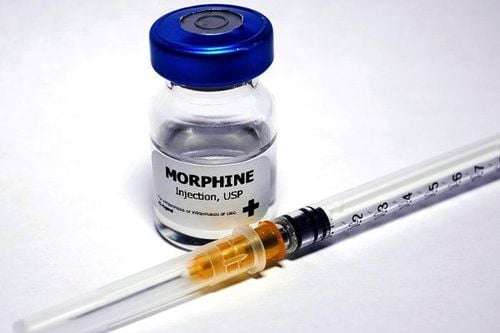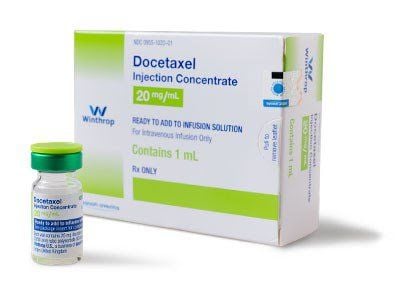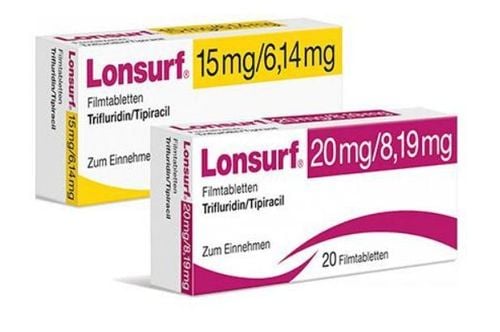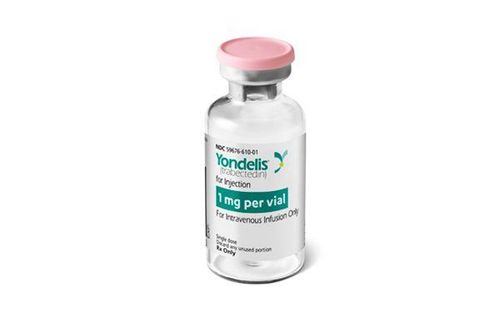This is an automatically translated article.
Chemotherapy or chemotherapy is the use of anti-cancer drugs that are injected into a vein (via an IV line or a central venous catheter) or taken in pill form. These drugs enter the bloodstream and travel to all areas of the body, making this treatment useful for cancer that has spread to organs beyond the original site.1. When to use chemotherapy drugs for stomach cancer?
Chemotherapy can be used at different times to help treat stomach cancer:
Chemotherapy drugs can be given before surgery for stomach cancer. This is called neoadjuvant therapy. Sometimes chemotherapy is used along with radiation therapy, which is called chemoradiation. Adjuvant treatment can often shrink the tumor and make surgery easier. This treatment can also help prevent stomach cancer from coming back and help patients live longer.
For some specific stages of stomach cancer, adjuvant chemotherapy is one of the standard treatment options. Often chemotherapy will be used again after surgery.
Chemotherapy may be given after surgery to remove stomach cancer has been performed. This is called adjuvant treatment. The goal of adjuvant chemotherapy is to destroy any areas of cancer that may be left but are too small to be seen. This can help prevent stomach cancer from coming back. Usually, for stomach cancer, chemotherapy is given along with radiation therapy after surgery. This can be especially helpful for cancers that cannot be completely removed with surgery.
Chemotherapy may be used as the main treatment if the cancer has spread (metastasized) to distant parts of the body, or if it cannot be removed for some other reason. Chemotherapy can help shrink or slow the growth of cancer, which can reduce symptoms and help people live longer. Doctors give you chemotherapy in cycles, with each stage of treatment followed by a period of rest to give your body time to recover. Each chemotherapy cycle usually lasts for several weeks.
2. What chemotherapy drugs are used to treat stomach cancer?
Many different chemotherapy drugs can be used to treat stomach cancer, including:
5-FU (fluorouracil), often used together with leucovorin (folinic acid). Capecitabine Carboplatin Cisplatin Docetaxel Epirubicin Irinotecan Oxaliplatin Paclitaxel Trifluridine and tipiracil are combined in one pill (Lonsurf).
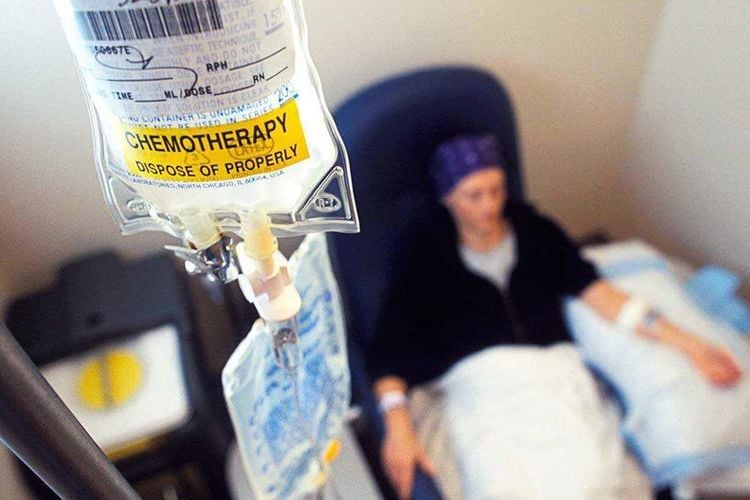
đIều trị bệnh ung thư dạ dày cần sử dụng một số loại thuốc hóa trị
Usually, 2 or 3 of these drugs are combined (sometimes with a targeted drug). This depends on factors like the stage of your cancer, your overall health, and whether chemotherapy is combined with radiation.
Three drug combinations can lead to more side effects, so they are usually reserved for people who are in very good health and can be closely monitored by a doctor during treatment.
For earlier stage stomach cancer, some common drug combinations used before and/or after surgery include:
Oxaliplatin plus 5-FU/leucovorin (FOLFOX), or oxaliplatin plus capecitabine (CAPOX). FLOT (5-FU/leucovorin, oxaliplatin and docetaxel). Docetaxel or paclitaxel plus 5-FU or capecitabine. Cisplatin plus 5-FU or capecitabine. Paclitaxel and carboplatin. If you also have radiation therapy after surgery, a single chemotherapy drug such as 5-FU or capecitabine may be needed.
For advanced stomach cancer, many of the same combination drugs may be used, although doctors often prefer a combination of 2 drugs rather than 3 drugs to try to reduce side effects. Some of the most commonly used combinations include:
Oxaliplatin plus 5-FU/leucovorin (FOLFOX), or oxaliplatin plus capecitabine (CAPOX). Cisplatin plus 5-FU or capecitabine. Irinotecan plus 5-FU/leucovorin (FOLFIRI). Paclitaxel plus cisplatin or carboplatin. Docetaxel plus cisplatin. Epirubicin, cisplatin or oxaliplatin, and 5-FU or capecitabine. Docetaxel, 5-FU and cisplatin, carboplatin or oxaliplatin. If a person is not healthy enough for a combination chemotherapy drug, a single drug, such as 5-FU, capecitabine, docetaxel, or paclitaxel can be used.
If one of these chemotherapy drug combinations (or a single drug) is no longer helpful, another drug or a combination of other drugs can be tried.
3. Side effects of stomach cancer chemotherapy drugs
Chemotherapy drugs attack rapidly dividing cells in the body, which can lead to side effects. These depend on the type of drug, the dose of the drug, and the length of treatment. Side effects from chemotherapy drugs can include:
Nausea and vomiting Loss of appetite Hair loss Diarrhea or constipation Mouth sores Increased chance of infection due to a lack of white blood cells. Easy bleeding or bruising due to low platelets in the blood. Fatigue and shortness of breath due to lack of red blood cells in the blood.

Thuốc hóa trị ung thư dạ dày có thể gây rụng tóc ở người bệnh
These side effects usually go away after chemotherapy treatment ends. As the hair will usually grow back once the treatment is over. Be sure to tell your cancer doctor about any side effects you experience as there are often ways to help you cope with them. For example, you may be given medicine to prevent or reduce nausea and vomiting.
Each chemotherapy drug has specific side effects and your doctor can help you know which of these you may need to watch out for.
Nerve damage (neuropathy): Cisplatin, oxaliplatin, docetaxel, and paclitaxel can damage nerves. This can sometimes lead to symptoms (mainly in the hands and feet) such as pain, burning or tingling sensations, sensitivity to cold or heat, or weakness. In most cases, this goes away after treatment is stopped, but it can persist in some people. Oxaliplatin can also affect the nerves in the throat, causing a sore throat that is worse when trying to eat or drink liquids or cold foods.
Damage to the heart: Epirubicin and some other drugs can damage the heart if used for a long time or in high doses. For this reason, doctors carefully control drug doses and use heart tests such as echocardiograms or MUGA scans to monitor heart function. The use of these drugs is stopped at the first sign of heart damage. Hand, foot and mouth syndrome: This syndrome may occur during treatment with capecitabine or 5-FU (by infusion). It starts with redness on the hands and feet, which can then progress to pain and sensitivity in the palms and soles. If the condition is more severe, blistering, calluses, or peeling of the skin can occur, sometimes leading to painful sores. The best way to prevent severe hand-foot-and-mouth syndrome is to let your doctor know if you have early symptoms, such as redness or sensitivity, so that steps can be taken to keep things from getting worse. should be worse.
Diarrhea: This is a common side effect with many chemotherapy drugs, but it can be especially bad with irinotecan. It needs to be treated immediately (at the first sign of loose stools) to prevent severe dehydration. If you are taking a chemotherapy drug that has the potential to cause diarrhea, your doctor will give you instructions on what medications to take and how often to take them to control this symptom.
Some chemotherapy drugs can cause other side effects. Talk to your doctor about the types of side effects you should watch for, as well as let them know of any side effects you experience.
To limit the side effects of chemotherapy for stomach cancer, talk to your doctor for advice. Vinmec International General Hospital is one of the prestigious cancer treatment medical facilities in Vietnam with a team of experienced, qualified, highly qualified doctors in the industry. The system of advanced and modern equipment helps the treatment process achieve high efficiency.
Please dial HOTLINE for more information or register for an appointment HERE. Download MyVinmec app to make appointments faster and to manage your bookings easily.
Reference source: cancer.org




